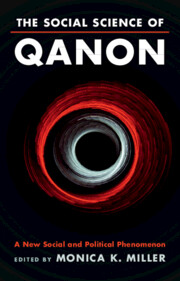Book contents
- The Social Science of QAnon
- The Social Science of QAnon
- Copyright page
- Dedication
- Contents
- Contributors
- Preface
- Part I Introduction to QAnon
- Part II Recruiting and Maintaining Followers
- Chapter 2 Down the Conspiracy Theory Rabbit Hole
- Chapter 3 Psychological Motives of QAnon Followers
- Chapter 4 Cognitive Processes, Biases, and Traits That Fuel QAnon
- Chapter 5 The Role of Moral Cognitions in the Growth of QAnon
- Chapter 6 Emotions and the QAnon Conspiracy Theory
- Chapter 7 Recruitment to QAnon
- Part III QAnon and Society
- Part IV The Role of Communication in Promoting and Limiting QAnon Support
- Part V The Future of QAnon
- Index
- References
Chapter 2 - Down the Conspiracy Theory Rabbit Hole
How Does One Become a Follower of QAnon?
from Part II - Recruiting and Maintaining Followers
Published online by Cambridge University Press: 14 September 2023
- The Social Science of QAnon
- The Social Science of QAnon
- Copyright page
- Dedication
- Contents
- Contributors
- Preface
- Part I Introduction to QAnon
- Part II Recruiting and Maintaining Followers
- Chapter 2 Down the Conspiracy Theory Rabbit Hole
- Chapter 3 Psychological Motives of QAnon Followers
- Chapter 4 Cognitive Processes, Biases, and Traits That Fuel QAnon
- Chapter 5 The Role of Moral Cognitions in the Growth of QAnon
- Chapter 6 Emotions and the QAnon Conspiracy Theory
- Chapter 7 Recruitment to QAnon
- Part III QAnon and Society
- Part IV The Role of Communication in Promoting and Limiting QAnon Support
- Part V The Future of QAnon
- Index
- References
Summary
The rise of QAnon in the US and abroad is best understood within a “socio-epistemic” context of hyper-polarized politics and populism, growing mistrust in authoritative sources of information, and the ubiquity of misinformation, especially from online sources. Although there has not yet been a systematic study of how people have come to be followers of QAnon, psychological research on conspiracy theories, cults, and “internet addiction” can inform applicable mechanisms of “recruitment” and “conversion.” Published anecdotal accounts likewise illustrate the process by which some individuals have fallen down the QAnon “rabbit hole.” Believers in conspiracy theories like QAnon can be modeled along a typological continuum that distinguishes “fence-sitters,” “true believers,” and “activists,” as well as “apostates” who manage to disaffiliate. “Clinical staging” of QAnon believers in this fashion might be useful in predicting effective interventions for those vulnerable or who succumb to belief in conspiracy theories.
- Type
- Chapter
- Information
- The Social Science of QAnonA New Social and Political Phenomenon, pp. 17 - 32Publisher: Cambridge University PressPrint publication year: 2023
References
- 2
- Cited by



